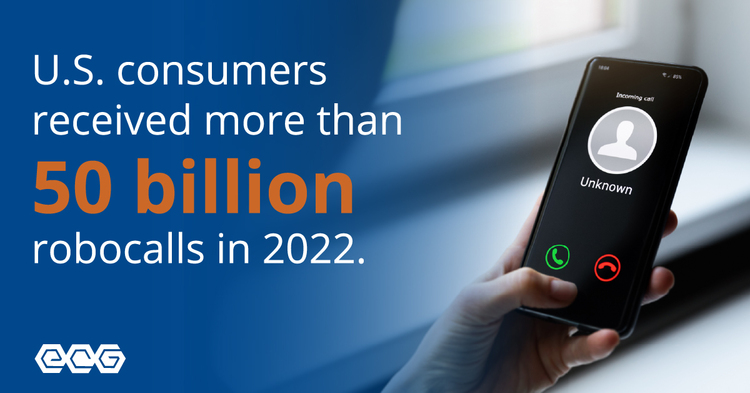Consumers lost nearly $9 billion to fraudulent calls in 2022.1 With nuisance calls on the rise, many businesses are looking for ways to effectively block robocalls from reaching their employees. In this blog, we’ll explore the various ways organizations are mitigating robocalls – so you can avoid losing money to potential scams and lost productivity.
How to Block Robocalls
Robocalls can be a major nuisance for businesses of all sizes. Luckily, there are a few steps you can take to mitigate their impact.
1. Add Your Numbers to the National Do Not Call Registry
The Federal Trade Commission manages the National Do Not Call Registry, which helps minimize unwanted sales calls. By registering your phone numbers with the registry, you can ensure legitimate telemarketers avoid contacting your company. While this might not eliminate robocalls altogether, it can reduce their frequency.
2. Set Up Call Whitelisting
Implementing call whitelisting allows only calls from pre-approved contacts or numbers to come through. By maintaining a list of trusted callers, you can block calls that don’t meet the specified criteria and ensure that only authorized callers reach your business.
3. Train Employees To Identify Nuisance Calls
Help your employees identify and handle spam calls appropriately by educating them about the characteristics of a robocall. Robocalls typically follow the same patterns, including a pre-recorded message, long pauses, and repetitive scripts. With proper employee training, you can create a proactive defense against these attempts.
4. Deploy Call Filtering Technology
Of course, one of the most effective ways to prevent robocalls is with call filtering tools. Many telecom providers offer call screening services that can automatically identify and block robocalls. By enabling call filtering, you can reduce the number of unwanted robocalls wasting your employees’ time.

How Robocall Blocking Relates to STIR/SHAKEN
Robocallers make hundreds of phone calls per minute using an autodialer, and these nuisance calls typically come from spoofed – or fake – phone numbers. While number spoofing can be useful for many telecom service providers, untrusted parties in the network are causing problems by using this technology to scam consumers.
The Federal Communications Commission (FCC) is enforcing STIR/SHAKEN, a series of standards intended to prevent fraudulent caller ID spoofing on public telephone networks, in an attempt to restore Americans’ trust in everyday phone calls. To comply with STIR/SHAKEN, voice service providers must ensure they have all the required components for caller identity authentication, signing, verification, and certificate management.
However, simply implementing STIR/SHAKEN won’t be enough. Service providers must also comply with regulations surrounding the proper use of caller IDs, including the TRACED Act and TCPA Act. And no matter what type of voice network your business uses – whether it’s a cloud-based phone system or plain old telephone service (POTS) – your provider needs to ensure you’re protected from robocalls.
Block the Right Types of Calls With Expert Guidance From ECG
While call-blocking tools can help reduce the number of nuisance calls and robocalls your business receives, blocking the right calls takes a lot of know-how. You need to identify your risk categories properly to ensure legitimate numbers aren’t flagged as spam; otherwise, your business may miss important calls.
ECG can configure your call-blocking tools to ensure nuisance calls stay out – and the right calls come through. Our experts help voice service providers implement STIR/SHAKEN and other important caller ID regulations, and we can make sure your business has the technology needed to eliminate time-consuming robocalls. Reach out to ECG today to learn more.
Sources:


